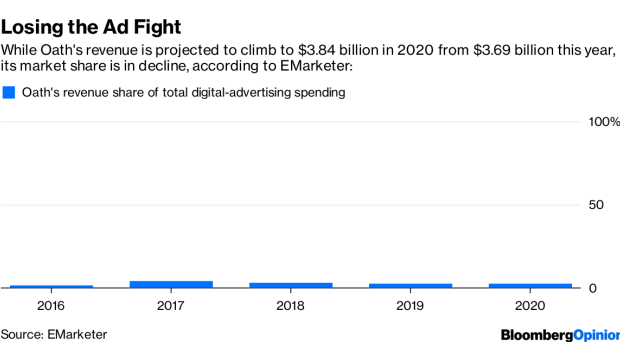Dec 12, 2018
Verizon’s Only Oath Is to Its Wireless Business
, Bloomberg News

(Bloomberg Opinion) -- The name was the first sign of trouble: Oath. After it was unveiled in April 2017 and met with confusion and mockery, Verizon Communications Inc. said calling its new advertising subsidiary Oath was meant to reflect a feel-good commitment, or some such. Now, Verizon seems to want out of that commitment.
Verizon spent about $9.5 billion to assemble Oath through the acquisitions of AOL and Yahoo during the last few years, replacing two well-known brands with the meaningless moniker and putting former AOL chief Tim Armstrong in charge of the new division. His goal – quite a lofty one – was to create a formidable competitor to Google and Facebook Inc. in digital-ad sales. Instead, the company said this week that Oath’s revenue and earnings have been lower than estimated due to competitive pressures and that the benefits of integrating AOL and Yahoo have also fallen short. Revised financial projections thus revealed a substantial reduction in Oath’s fair value, resulting in a $4.6 billion writedown – about half what Verizon paid for the business. Should have called it Ouch.
Armstrong’s vision involved using AOL and Yahoo’s hodgepodge of internet destinations – including Huffington Post, Yahoo Finance, Yahoo Sports and TechCrunch – to become a digital-ad powerhouse, while leveraging Verizon’s base of 117 million wireless subscribers seeking news and entertainment on their devices. But Armstrong’s successful personal brand building and the weight his name carries in the industry doesn’t align with his track record, something Verizon should have recognized. His efforts around Oath were largely a disappointment, not unlike AOL’s purchase of HuffPost, in which Armstrong overpaid and wildly overestimated the business’s profit potential. At Oath, the business’s share of the digital-ad market continues to shrink, amid rising competition from Amazon.com Inc. and Snap Inc.’s Snapchat, according to EMarketer.
Verizon’s stock rose 1 percent on Tuesday before falling 2 percent Wednesday morning, indicating investors were initially more relieved than alarmed. This moment was a while coming, and even though it won’t be good for this quarter’s earnings report, it does little to dent the confidence in what is otherwise a strong and stable wireless carrier. Remember, Oath accounts for less than 6 percent of Verizon’s total revenue. Lowell McAdam, Verizon’s longtime CEO who struck the AOL and Yahoo deals, stepped down in August. His successor, Hans Vestberg, has since made it no secret that his strategy differs from that of McAdam’s by being almost singularly focused on the wireless-network business and with no ambitions for more media deals. Following weeks of rumors that Armstrong would be next to go, he left in October. A reassessment of Oath’s presence within the telecommunications conglomerate was expected.
It’s not the only telecommunications company to botch its media strategy. AT&T Inc.’s $63 billion takeover of DirecTV in 2015 quickly soured as the satellite-TV provider bled customers (and continues to). It’s generally believed that Time Warner, its more recent megadeal, is an attractive set of assets, but AT&T’s stock has tumbled more than 20 percent this year. Already investors are concerned about AT&T’s ability to maintain its dividend growth while chipping away at its massive debt pile and investing in its 5G wireless network.
The question of Oath’s future at Verizon still appears unresolved. In the backdrop, 10,400 Verizon employees are leaving the company as part of a buyout program costing at least $1.8 billion in severance payments in the fourth quarter. As part of Vestberg’s recent reorganization, Oath was also renamed Verizon Media Group/Oath. Some took it as a sign that Verizon may already have one foot out the door, even though Vestberg has tried to tamp down speculation that the company is shifting away from Oath, with vague explanations about how it fits his vision.
Still, in a September interview on CNBC, Vestberg said that he’ll measure the success of Oath by its ability to gain a wider market share. If that’s the bar, it’s not looking good for Oath.
To contact the author of this story: Tara Lachapelle at tlachapelle@bloomberg.net
To contact the editor responsible for this story: Beth Williams at bewilliams@bloomberg.net
This column does not necessarily reflect the opinion of the editorial board or Bloomberg LP and its owners.
Tara Lachapelle is a Bloomberg Opinion columnist covering deals, Berkshire Hathaway Inc., media and telecommunications. She previously wrote an M&A column for Bloomberg News.
©2018 Bloomberg L.P.





